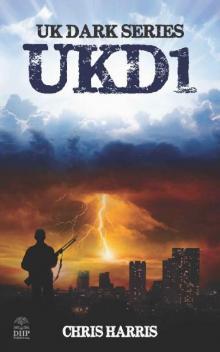- Home
- Harris, Chris
UK Dark Trilogy
UK Dark Trilogy Read online
The
UK Dark Series
UKD
by
Chris Harris
COPYRIGHT
This novel is entirely a work of fiction. Any names, characters, incidents and locations portrayed in it are the work of the author’s imagination. No affiliation is implied or intended to any organisation or recognisable body mentioned within.
Copyright © DHP Publishing 2017
Chris Harris asserts the moral right to be identified as the author of this work. By payment of the required fees, you have been granted the non-exclusive and non-transferable right to access and read the text of this ebook on screen or hard copy.
No part of the text may be reproduced, transmitted, downloaded, decompiled, reverse engineered or stored in or introduced into any information storage or retrieval system, in any form or by any means, electronic or mechanical, known or otherwise yet invented, without the express permission of DHP Publishing Ltd.
www.dhppublishing.co.uk
CHAPTER ONE
Am I a Prepper? No of course I’m not! But then again, I like to think that being a bit prepared won’t do any harm.
This is the story of how being “a bit prepared” kept me, my family and my friends alive after the world was hit by a Coronal Mass Ejection from the sun and changed forever.
The present day: Friday 9 October 2014
Becky was ahead of me, pushing a fully loaded shopping trolley and I was weighed down by four heavy carrier bags when it happened. From the High Street just behind us, came the sound of cars crashing into each other and screams. A car driving past us down the road suddenly slowed down, swerved a few times as if the driver was having trouble steering, and then crunched into a parked car. We looked at each other in horror, I told Becky to stay there and I ran back up to the main road.
It was chaos. Cars, buses and HGVs had all crashed, either into each other or into the buildings on either side of the road. I wanted to help, but I knew we had to get our children back home safely. I ran back to Becky, who was in tears. I gave her a hug and told her:
“It’s going to be fine, my love, we knew this was going to happen and we are as ready as we can be to survive this. Now let’s go and get the kids.”
Two years previously
My name is Tom and I live in Moseley, a suburb of Birmingham, with my wife Becky, my two kids, Stanley and Daisy, and two dogs.
We have a great life; I renovate properties and sell them, and my wife, who gave up her career as a lawyer when our first child Stanley arrived, now works for a few of her old clients as a legal consultant. We have the best of both worlds; enough money coming in so that we can enjoy life without worrying about it, and the free time that you can only get when you work for yourself.
We take it in turns to drop the kids off at school and we never miss a sports match or school production. An ideal world, you might say, BUT I am an avid reader and a few years ago I went through a stage of reading disaster books, books about the world ending due to zombies, plagues, volcanos, meteor strikes, EMPs (Electro Magnetic Pulse) caused by nuclear explosions or solar activity.
You name it, I read about it. Which got me thinking, what if? Initially my thoughts confined themselves to a pub conversation with my mates. How would we survive when the zombies took over the world?
Naturally we would all turn into Rambos, heroically rescue our families and survive. Then the next day, when the hangovers had worn off, we carried on with our normal lives, forgetting all about our foolproof plans to survive the end of the world.
Sitting at home in my office one day, a bit bored and looking for something to do (other than the work I was supposed to be doing), I thought, let’s see what information is out there. An hour’s research later I came to the following conclusions: OK, you can discount the zombie scenario, much too “Hollywood” and totally improbable. The Plague? You either live or die, but if you live, how would you survive in the lawless empty world that would follow? Volcano?
Not many of those in England, so forget that one. Meteor strike? Well it killed the dinosaurs off; would humans be capable of surviving a decade-long winter caused by an atmosphere clogged with dust? Maybe, but then it would be about survival and I’m coming to that. Nuclear attack? I live two miles from the centre of Birmingham, so we’d probably be toast. Nuclear EMP? That could happen, but it would only knock out the power and electronics over a specific area, so help would arrive eventually.
That narrowed it down to an EMP caused by a solar storm. There is a wealth of information out there about them, including why they happen, past events, predicted future events and the effect they would have on a modern world so dependent on technology. I discovered that a solar storm is a storm on the sun, which shoots out massive amounts of energy and particles into space.
If the Earth happened to be in the way, we would be hit by X-rays and ultraviolet light which would ionise the upper atmosphere and interfere with radio and satellite communication.
This would be closely followed by a radiation storm, which would be OK for everyone on Earth as we are protected by our atmosphere, but not so good for astronauts up in space, which is why space stations have a specially shielded area, so they can be protected until the storm passes. Following the X-rays, ultraviolet light and radiation, there would be a slower moving cloud of charged particles called a Coronal Mass Ejection or CME for short. These can cause electromagnetic fluctuations in the Earth’s magnetic field which, if strong enough, can create power surges in anything electrical that is not protected.
I learned that Earth is regularly hit by these solar storms, causing no more trouble than a crackly international phone call, or resulting in their most beautiful effect, The Northern Lights, a phenomenon which most of us would love to see at least once in our lives.
I discovered that in the past, the Earth has been hit by bigger solar storms and that many have been documented, with the largest being known as the Carrington Event of 1859.
On this occasion, the Northern Lights could be seen as far south as Cuba, but more worryingly, the US telegraph system was badly affected, with operators reporting sparks leaping from their equipment and in some cases, catching fire. In that pre-electric horse-drawn era, most people were not affected. More recent events had caused power failures in Canada and Scandinavia, all short-term disruptions, because only one area had been affected, and power was quickly restored.
That didn’t sound too bad and yet, sitting at my desk, I looked around thinking what would be affected if the power surge created was strong enough. The computer, full of delicate little chips and processors, would surely be damaged. My phone? Yep, basically a small computer so that would go as well, as would the calculator, printer and clock radio.
In other words, everything that required electricity in my office would only be good for the skip. I walked around the rest of my house in my head and it didn’t take long to work out that anything with a plug at the end of it would probably be ruined. Looking outside at my wife’s car on the drive, I realised that all modern cars have computer chips in them.
Would they still work? Another ten minutes of research left me confused, because the government agencies and scientific reports assured me that everything would be fine, and the private prepper (mainly American chat room) sites all insisted that the computer chips in cars would be fried (in other words they wouldn’t!) So let’s assume the worst, because would the government release information telling you that the country is not prepared for an event which would send us back to the Middle Ages?
Of course not. They’d have to adopt the attitude that it would be all right, it could never happen, and you’d have to sincerely hope that if it did, they would be in opposition government. At this point, they coul
d stand up and blame the current government for not being ready, because had they been in power, they would, of course, have seen this coming and would have had the whole country ready.
After more research, I discovered that old cars without modern computer chips should be OK. The batteries might be ruined, but as they are much simpler beasts, with a battery to start them and an internal combustion engine to move them, they should still work. I thought about my old Land Rover (a mid-1970s model) which I used for work.
It was a great workhorse and, with my trailer, enabled me to collect all my materials from my builders’ merchant for my latest project, and to take the rubbish away to the local council tip. It saved me a fortune in skip charges. Plus, it was great fun to drive, it rattled and bumped along the road, the steering seemed to have a life of its own, and the brakes always seemed to work just enough to stop it where it should, once you’d opened your eyes.
This, in my view was far more enjoyable than the modern, practical, precisely engineered cars we were used to today. In short, this was exactly the kind of vehicle I would need if the big one ever hit Earth. I had hand painted it military green and Stanley thought it looked like a real army jeep, so he loved riding around in it, pretending he was a soldier.
That got me thinking about our power supplies. Would they survive and still work? According to government papers on meetings with the power supply companies, as long as the event was not too severe, most of the power grid would be OK, as they were designed to survive the effects caused by a CME up to a certain level.
Some transformers would be damaged and power would be out over mainly rural areas for a time, until the transformers could be replaced or repaired.
I then wondered, if the event was severe enough, how many transformers would be damaged? Would the computers in the control rooms that managed the power stations and the distribution of power around the country be affected? And if vehicles were disabled, how would they even get the new spares and parts to the affected areas? And did they have spares? Presumably these things rarely broke down, so why have a yard full of spare, very expensive transformers? The permutations were mind boggling, but as I was in “doom and gloom” prepper mode, I had to assume that the power would be out for a very long time.
Is this likely to happen though, I thought? I discovered that the sun works to cycles which the scientists study and map, in order to try to predict solar activity. They all seemed to agree on a one hundred and fifty-year cycle, with the sun at present going through a quiet period, which they predicted usually preceded a time of increased activity.
The last major event had been in 1859 and as it was now 2012, it didn’t take a genius to work out that we were overdue for Earth being hit by a larger than normal solar storm.
At my desk, I imagined myself turning into a caricature of a prepper, wearing a checked lumberjack shirt, sporting a big bushy beard, sitting on the rocking chair on my front porch, a shotgun laid across my lap and telling everybody to “get off ma property”.
An amusing picture, but not very practical in a Birmingham suburb.
Time and life moved on, as it generally does, with work, enjoying time with the family, holidays, going out with friends, all the stuff which I’m sure we are all familiar with. The weeks and months seem to fly by with ever increasing speed the older we get. But it was always there at the back of my mind. What if this event did happen? I wasn’t doing my family or myself any favours by hoping it wouldn’t, because when it did, if we weren’t ready for it, it would be too late.
You’d be just as stuffed as the rest of the country, for the sake of a cupboard full of cheap supermarket baked beans. So once more, in an effort to avoid working in my office, I decided to research how much food you would need to store to last a family of four for a year. The answer was a lot, not just a cupboard full of baked beans.
This is the list I made, from reading the mainly American prepper websites, in order to feed my family for 12 months:
500kg wheat
200kg rice
90kg each of beans, peas and lentils
100kg of honey or sugar
5kg salt
large tins of peppers and herbs for seasoning
150Kg dried milk
dried fruit
90kg oatmeal
loads of tins of meat, vegetables, fish and fruit
The above might seem a ridiculous amount, but when you visualise fifty two weeks’ worth of supermarket shopping trolleys, plus the last minute items you buy as extras from the shop at the top of the road, that’s going to be a lot of food.
So I thought, “Yes, it’s probably a good idea to prepare myself for the worst. But how will I go about doing it without being labelled the local ‘nutter’, with all our friends taking the mickey out of me? How will I explain it to Becky without her thinking I’ve lost my mind? Even telling my family about my plan will require careful consideration.”
After a long, thought filled process of about five minutes, I decided that it was best to be direct and to come straight out with my theory, then take a step back, assume the brace position and see what happened. Life sometimes surprises you.
“Why do you think this is going to happen?” she asked me.
“Right, well, it all started with me reading all those books.”
“The ones I keep telling you are rubbish?”
“Yes, those. Well, that led to me doing some Internet research, …”
“And that was when you were pretending to be busy in the office, I suppose?”
“Er, yes. Well, that led to further research. Just listen while I tell you what I’ve found out.” As a result, I was now sitting across our kitchen table from her, and discussing the end of the world as we know it over a cup of coffee and some chocolate biscuits.
Over the next few weeks, Becky read one of the books, looked at the information I’d shown her and came to the same conclusion as me. It could do no harm to be a little bit prepared “just in case”. I knew I had fallen in love with and married the right girl.
CHAPTER TWO
We had some choices to make. To begin with, we needed to draw up a list of items to buy and decide on the best place to go. Was it best to go out immediately and buy everything, or acquire it gradually over a period of time? The contents of the list kept changing, but the main categories stayed the same.
Food: This would obviously come first. We were accustomed to using a local trade-only warehouse for goods such as pet food and toilet rolls etc, because it was local and it was just more convenient to buy some items in bulk. We decided to buy in extra stocks whenever we went, particularly things like catering packs of flour and pasta and slabs of tinned goods. On our weekly shops, any goods we might need that were on special offer would also be purchased.
How and where should we store the goods? The garage proved to be the obvious choice. It was large, dry and easy to unload the stuff into, because you could back the car into it. The garage in our house was a huge space, built under the kitchen at the rear of the house and with a steep driveway down the side of the house for access.
I think the house, which was built in 1895, was designed to have a coach house and as the plot wasn’t wide enough for a separate coach house, the architect designed it to go under the house. The garage was also equipped with a secure automatic roller door.
The tinned goods would be fine stored as they were, but foodstuffs such as pasta, rice and flour would need to be kept dry and safe from rodents. It would be an absolute waste to go to the effort of buying and storing it, only to find out that mice or rats had been nibbling away at it. It could also potentially mean the difference between life and death. Now that was a sobering thought.
Having searched the Internet and pondered the problem for a while, I found an auction house that sold anything and everything, from furniture to bankrupt stock, and at its next sale one of the lots was sealable plastic storage boxes. Talk about Karma or Cosmic Ordering or whatever you believe in, this was a stro
ke of luck. And who would want to buy five hundred of them? Only me apparently, and at £250 for the lot, this was an absolute bargain. As Becky had a bit of a grumble when she saw the sheer volume of plastic boxes, I decided to put most of them in the attic and bring them down only when needed. After all, it would take a long time to fill them with the goods we would be buying.
The next consideration was that there is no point in having all this food if you can’t cook it. As we were living in a city, we were reliant on mains gas and I worked on the assumption that, for a while at least, the mains gas would continue to work due to pressure still in the system.
But, eventually, the gas would stop flowing. Could we cook all our food on the gas barbecue? Yes, probably. You could also buy gas bottle operated ovens for caravans and boats, so one of those would be very useful. But how much gas would I need? My gas barbecue had a testing plate on it which stated, when all the burners were on, that it consumed 1kg of gas per hour. On a rough calculation of one hour of cooking each day, I figured that a gas bottle would last thirteen days, so I would need twenty eight bottles per year, or thirty, to be sure. That would mean storing a lot of bottles and spending a lot of money to buy them. I decided to pick up empty bottles cheap when I found them, and exchange them for full ones, but not to go mad. I therefore limited the amount to four or five, in the hope that I would find a better solution. It occurred to me that we have two log burners in our house. I’d always been able to get an unlimited supply of offcuts of timber through my work, and with the price of gas, they had helped to keep our heating bills down. If the worst happened, I was sure they would be OK to heat saucepans of food and water on.
General Equipment: This was next on the list and included candles, matches, paraffin lanterns, lighters, water purifiers etc. This was the list that you could never finish, because you were always thinking of something else you absolutely definitely needed. Again, the easiest way to buy these items was gradually, over a period of time. If you knew what was on the list, you were always keeping an eye out for bargains. I could never pass a car boot sale without popping in for a little browse.

 Zombie Castle Series (Book 3): ZC Three
Zombie Castle Series (Book 3): ZC Three UK Dark Trilogy
UK Dark Trilogy Zombie Castle Series (Book 4): ZC Four
Zombie Castle Series (Book 4): ZC Four![Zombie Castle Box Set [Books 1-3] Read online](http://i1.bookreadfree.com/11/zombie_castle_box_set_books_1-3_preview.jpg) Zombie Castle Box Set [Books 1-3]
Zombie Castle Box Set [Books 1-3] UK Dark Series (Book 1): UKD1
UK Dark Series (Book 1): UKD1